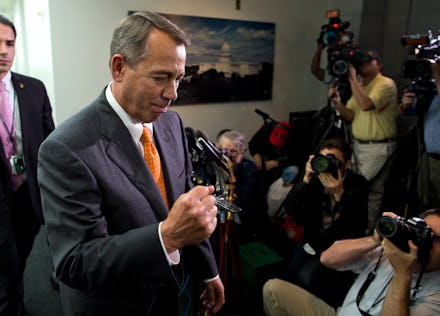Pissed Off At Congress? Now You Have Someone to Blame

Americans hate Congress.
That fact is unsurprising given Congress' series of abject failures, most recently the politically toxic and wildly unpopular government shutdown.
Moreover, Congress seems incapable of arriving at anything even resembling compromise, the "oil that makes governments go," according to former President Gerald Ford. Passing once routine legislation, like the Farm Bill, is now an exhausting, persnickety process. Ostensibly uncontroversial bills — Hurricane Sandy aid, for instance, or renewing the Violence Against Women Act (VAWA) — engender pointless partisan intransigence, much to the chagrin of more moderate voices and at the expense of citizens mired in unthinkable hardship. When members of what is nominally the world's greatest deliberative body spend their time reading Dr. Seuss and challenging people to duels, you know something is wrong.
Some perspective: President Harry Truman derided his legislature as a do-nothing Congress for passing just 906 laws. In contrast, the 113th Congress is on pace to pass an astonishing 72 laws in its two-year term — less than 8% of the original do-nothing Congress' final tally. Of course, some may argue that focusing on the amount of bills is the wrong metric with which to judge Congress. House Speaker John Boehner (R-Ohio) said that Congress should be judged on how many laws it repeals, not how many it passes. (For the record, the 113th Congress has repealed zero laws.)
Despite these disturbing trends in Congress as a whole, the Senate is actually operating at a comparatively efficient level. The higher chamber has moved numerous bills, only to see them collapse in the Republican-controlled House. Here are three important, bipartisan bills stalling in the lower chamber.
1. Immigration Reform
After the 2012 election cycle, immigration reform — long dormant political issue — again became a major legislative priority. The issue has always been on Democrats' wish list, and the GOP's horrible performance with Latinos — President Barack Obama won 71% of that demographic — necessitated immediate action. And so the Senate's Gang of Eight was formed to craft comprehensive immigration reform.
Last summer, the Senate successfully passed the Border Security, Economic Opportunity, and Immigration Modernization Act, the most important and expansive immigration reform bill in a generation. But the House has refused to consider the issue so far, with Boehner declining to bring immigration to the floor as the fall's budget negotiations approached. Even reform-minded GOP legislators now concede the prospects for substantive immigration reform this year are dim.
This is disconcerting in many respects. A recent TIME article indicates that "the vast majority of the economic literature argues that a more liberal immigration policy would be good for the U.S. economy as a whole." Furthermore, immigration reform is good politics: polls conducted in 29 states by three pro-reform groups revealed between 61-78% support for the Senate bill in each surveyed state. Meanwhile, the GOP would do well to make some inroads with Latinos, as recent electoral trends suggest.
Last April, the Senate passed its first formal budget since 2009, but the House is preventing Senate Majority Leader Harry Reid (D-Nev.) from establishing a conference committee that would push the process forwards. Interestingly, the federal government hasn't passed a budget in four years: Congress routinely relies on continuing resolutions and omnibus spending bills in place of full budgets, having only passed a complete set of spending bills four times since the advent of the modern budget process.
Still, it'd be nice to see a formal budget come out of conference committee. Considering the GOP made the Senate's inability or unwillingness to pass a budget a major talking point, the House should emphatically support reconciliation.
3. LGBT Rights
As states continue pivoting towards the right side of history — embodied most recently by Illinois' overdue recognition of gay marriage and last summer's pair of historic Supreme Court decisions — the Senate voted to ban LGBT discrimination by passing the Employee Non-Discrimination Act (ENDA), which amends Title VII of the Civil Rights Act. The bill now awaits a House vote and... well, you know: Boehner, under pressure from religious organizations, opposes it, citing economic concerns. This, even while major business leaders, namely Apple CEO Tim Cook, support ENDA as a boon for the economy.
All told, the Senate is doing its job. It's now contingent on the House to control its most fringe elements and affect beneficial change. Unfortunately, that requires the c-word: compromise. And if this is truly the oil of government, the capitol is surely facing an energy crisis of its own.